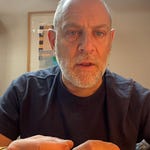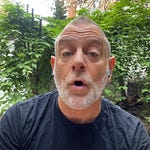Playback speed
×
Share post
Share post at current time
Share from 0:00
0:00
/
0:00
Transcript
Why is the Prophetic Menorah Outside?
Weekly Video Recap of Below the Bible Belt
Jan 05, 2024
The skeletal remains of traumatized victims in the vast valley suddenly begin to move and return to life, bone by bone they patch themselves back up, like zombies in some B Movie, the dead wake up, limbs patch, flesh grows, and then the prophet breaths into their nostrils, god-like, the breath of life, as the nation rises up again from its mass burial pit, shakes off the horrors of the past and makes its way back home towards the future.
I’m Amichai, in Jerusalem today, in front of the Knesset, mid way through the journey of reading the bible a chapter each day and making sense of the old to help now be more meaningful and helpful. Yesterday we wrapped up chapter 500, 429 to go, as we finished reading the Book of Ezekiel, first prophet of the exile, and the verbal visionary who hallucinated this famous symbol of the valley of dry bones - 2,600 years ago, as yet another war ravaged the middle east.
Ezekiel ben Buzi was a priest in Jerusalem, who became a refugee and exile and a Babylonian prophet. Along with the humiliated king of Judah and the royal court, Ezekiel was relocated - a nice way to say exiled - to the slowly growing refugee camps by the rivers of Babylon, where the survivors of Judah started rebuilding their lives.
While Jerusalem, under siege, starved and defiant, still breathed its last breaths of futile resistance against the mighty empire of Babylon, just before its imminent destruction, Ezekiel, far away, imagines a future return and for 48 chapters that we just finished reading he tries to give his people’s trauma a taste of future hope and something to hold on to while the wars and wanderings go and they have to get to used to living in a foreign land, without a king or temple.
Ezekiel is not the last of the Hebrew prophets but he is the last one to have such major coverage. Following his, starting this Sunday are the 12 minor prophets, each with his own historical context and literary style, spanning three centuries, three empires, and critical movements in the lesser known histories of the people who will one day be known as the Jewish nation. The last of those 12, Zecharaia, famously said - not by force and not by might, but my spirit, says the God of Israel -- a vision of national triumph, much like Ezekiel’s, that is grounded in the spirit of love, not the actions of hate, a promise of life not with weapons but with love.
Both Ezekiel and Zechariah are prominent features of this art piece that I’m standing in front of today. This is the Knesset Menorah - dedicated in 1956 and eventually placed here, in front of the Israeli Parliament.
This was a generous gift of the British Parliament and wealthy British Jews to the young new Israeli parliament -a gesture of reconciliation. The Menorah symbolizes the same one depicted on the Titus Arch in Rome, on which the Menorah taken from Jerusalem as loot by the Romans 2000 years ago is shown. Now that the Jewish home is to be rebuilt, a menora of equal prominence should guide its way.
THe German-Jewish famous artist Benno Elkan, who, like Ezekiel, became a refugee in 1933, fled Berlin and resettled in London, took six years to design this 4 ton Bronze menorah with multiple scenes of Jewish history - patriarchs and prophets, sages and warriors, exiles and revelations, leading all the way to the Warsaw Ghetto Uprising and the war of 1948.
Ezekiel’s dry bones are there on the bottom, and Zechariah’s words are on the central branch.
Why is it outside and not inside the Knesset? Well. Even back in 1956 there was a religious-secular debate. The Ultra Orthodox demanded some changes that will not make this work of art look like idolatry, and the Communists refused to have a ritual object, even as art, inside the civic center.
So it ended up outside, seen daily by many, not just by the politicians.
The last time I was here was a year ago, when this evil Jewish supremacist government led by I don't even want to say his name, was sworn in, and thousands of us gathered here to protest. “Swear that you will protect me” a a banner with a rainbow flag asked in Hebrew and Arabic. A year later we know better than to expect anything but blood from this government and I sincerely hope that in the next few months we end this war - remember Zechariah’s visions --- and help Israel elect a much better, wiser, kinder and strategic leadership that will help us rise from the heap of ashes, heal and hope, commit to peace and justice - not just for Jewish people but for all.
Join me on Sunday to go back in time to the 8th century BCE, to the slopes of Samaria, and meet Hosea, our next prophet with a big mouth reminding us that words matter and love matters most.
Thank you for joining be below the Bible Belt. We pray, from here, for better leaders, for no more way right now, for healing and for consolation, and for peace.
Shabbat Shalom
Recent Posts












Share this post